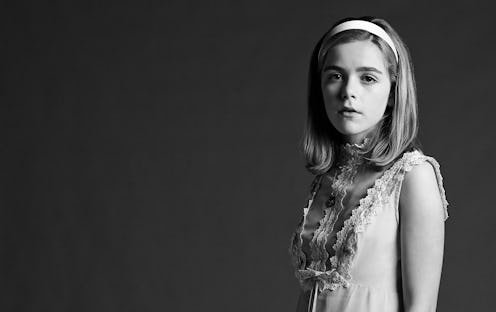Entertainment
Sally Draper Saves The Finale, And The World

Over the course of eight years, we've seen Sally Draper grow from an adorable young girl with a lisp and some hair-bows into a full on adult. Most children don't become adults until they're 18, but that's not the case for Sally, whose wool cardigans, plaid skirts, and the undeniable underbelly of an awkward phase don't seem to hide her mature core. In the Mad Men series finale, Sally Draper reveals herself to be the strongest, smartest, and most compassionate of the all the Drapers. Er, all the Whitmans. Er, all the Francises? Sally has seen more than her fair share of change, yet she is stable. She is everything her parents are not. She is not likely to change.
When her father, still buzzing from the adrenaline rush of having gone fast in a car, tells Sally that he'll come home to care for Bobby and Gene, Sally, solemn and stoic knowing what she knows, sets him straight. She's given this more thought than he has, she says, and she's right. She knows Don won't make a good father, and she protects her brothers from his unreliability.
Don, realizing he can't save his own kids, tries to save the real Don Draper's child. Sally, on the other hand, hops on a train home. She's cancelled her trip to Madrid. We hear Gene's first words on camera as he speaks to Sally, after she orders him like any '70s mom would, to go watch TV. Bobby, having trouble making dinner, feels relief when Sally tells him to hand her frying pan, she knows how to do it.
Sally's final storyline syncs nicely with the other women's. As she becomes the boss of her household, Peggy and Joan become the bosses of their destiny. Harris Olsen, anyone? After all the sexism they've endured over their careers, it's time they branch out and start something on their own. No one will tell Peggy and Joan what to do. They'll report to ... no one. No one will get in their way. It's a feminist move, a brilliant move, and one the audience can only hope Sally will somehow find out about.
Because let's face it, Sally's role models are non-existent. Her mother, depressed and aloof, only gives Sally instructions when it comes to dealing with her death, not comfort. Her father, depressed and aloof, only gives Sally attention when he has time for it, and ultimately decides that he'd rather abandon her entirely, rather than be there for her half-heartedly. Her step-father, depressed and aloof, doesn't know her. Her friends, what we know of them, are depressed and aloof, and only want what most teenagers want: to seem like they're cool.
But Sally, depressed and only mostly aloof, has empathy. She makes choices that better people. She's in trouble, though, as Don will be back in her life. Sure, he's seen the light and wants peace and harmony — he even wants to hear the world sing — but if there's one thing Don is, it's inconsistent. Stay strong, Sally Draper. Stay you. Remember: there's no such thing as doe-eyed turtle doves.
Image: AMC